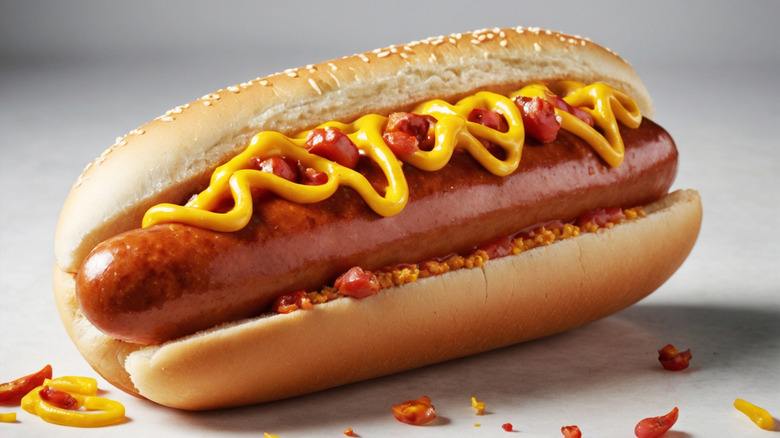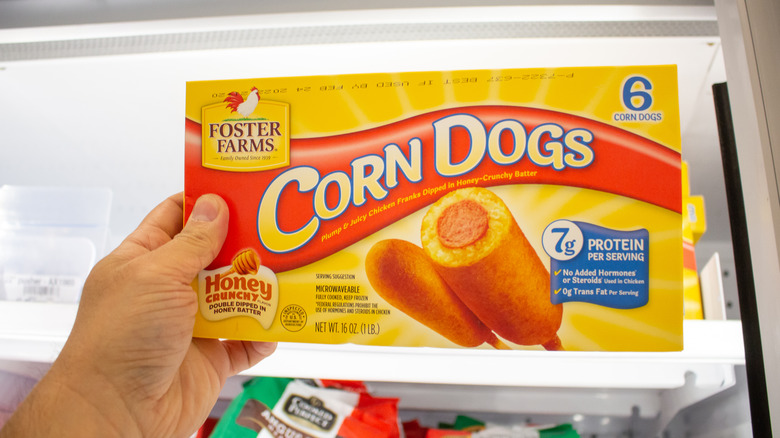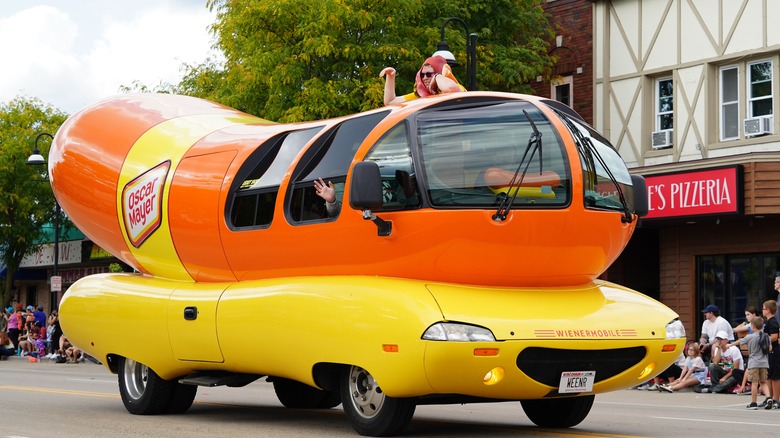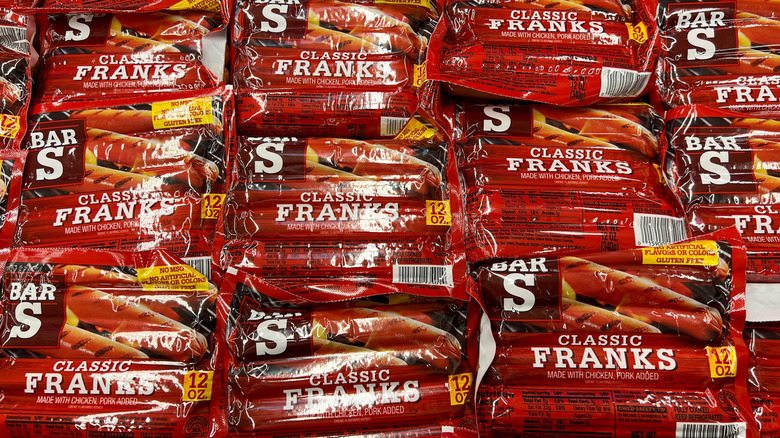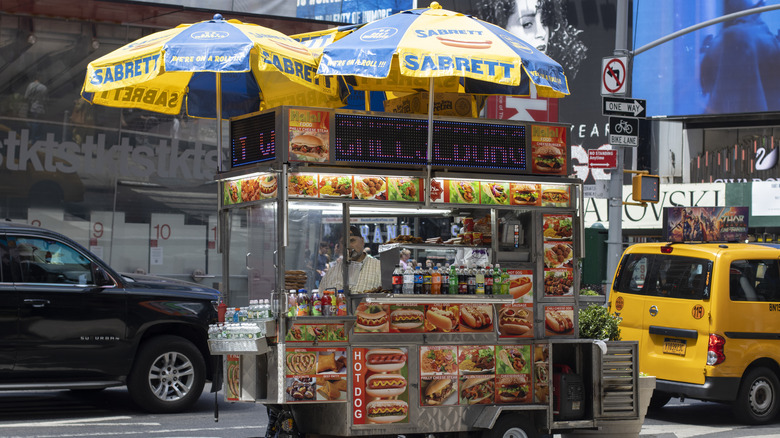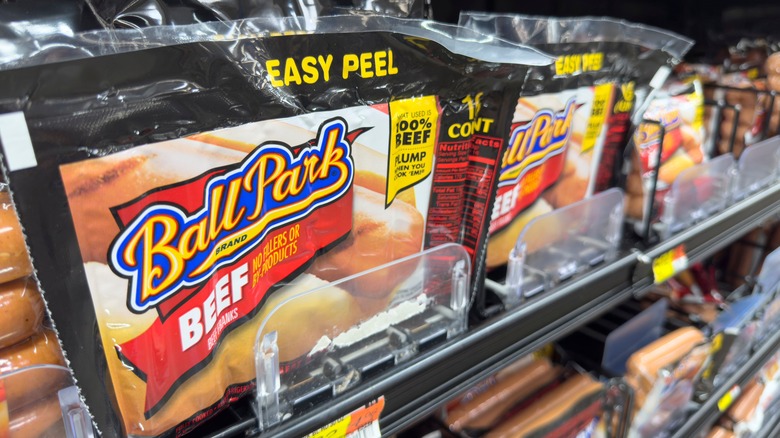13 Massive Hot Dog Recalls That Swept The US
It's true you can't make an omelette without breaking some eggs. So it was that hot dogs couldn't make it to backyards and ballparks without the occasional safety recall. When it comes to the highly processed product, debates over topping them with mustard, ketchup, or some of the more unique regional favorites couldn't come to pass without first ensuring food safety wasn't treated as a joke. That meant even the smallest misstep could amount to a major upset for manufacturers in the United States.
Thanks to keen-eyed inspectors with the U.S. Department of Agriculture (USDA), attentiveness of contractors, and employees of hot dog producers — along with the occasional customer complaint — many issues have been addressed before serious problems could arise. However, when the risks have involved potential allergens, foreign contaminants like metal or bone fragments, or dangerous bacteria such as listeria, discarded dogs weren't the only costs accrued. In fact, among some of the nation's largest hot dog recalls you'll read about here, one was brought on by deadly consequences. Here's 13 hot dog recalls that hit the U.S. pretty hard.
Surface contamination forced major hot dog recall
A huge example of just how serious the risk of listeria monocytogens have been treated came courtesy of the Seattle, Washington-based business, Espi's Sausage & Tocino Co. For the minority women owned enterprise, great lengths were taken during the mass production of their Philippine style foods to keep the bacteria responsible for listeriosis infections away. So it was in the case of a September 2021 recall when it wasn't their ready-to-eat chicken and pork hot dogs that were flagged positive when testing for the bacteria, but rather a surface with which the product had come into contact.
Considering the threat posed by listeria — especially to the elderly, newborns, pregnant women, and those with compromised immune systems — it makes perfect sense this threat was taken seriously. Comfort should be found in knowing that even a possible trace contact as confirmed by a third-party lab proved enough to issue a recall on nearly 2,050 pounds of product. Specifically, consumers of California retail locations were advised of the risks of the Argentina brand jumbo Mighty Meat Chicken and Pork Hotdog's that were produced on May 19, 2021.
Nearly 7,000 pounds of hospitality-bound franks missed inspection
Known as a staple of county fairs and baseball stadiums across America, many people are also accustomed to seeing hot dogs on menus — especially for the booster seat-saddled, picky eaters among us. When chicken nuggets, tenders, or some variety of pre-made macaroni and cheese won't entice little ones, kids often turn to hot dogs. In July 2024, restaurants and hotels throughout Ohio and West Virginia may have had some disappointed tykes after a state health inspector noticed products had been shipped without their federal inspection.
For AW Farms out of Argillite, Kentucky, the discovery meant a recall of nearly 7,000 pounds of hot dogs after the inspector had notified the USDA's Food Safety and Inspection Service (FSIS) of the lack of oversight. Since its 1906 inception, the regulatory agency had expanded beyond its initial oversight of meat to also ensure the public health for poultry and eggs. As for the businesses who'd received any of the hot dogs in question that were produced after May 30, 2024, they were advised to return the hot dogs or discard them.
Foster Farms Honey Crunchy Corn Dogs allergen risk
Though many jokes have been delivered at the expense of the humble hot dog's components, long gone are the days where mystery shrouded the corner street vendor's fare. Now, ingredient lists and nutrition facts can often be found publicly displayed. While some would rather not have the calorie count of their preferred awe-inspiring indulgence published in bold print near a tantalizing photo, aspects of such measures were touted as life-saving for those at risk of allergies.
Despite steps taken toward that end, mistakes have happened and in 2012 that meant the recall of 16,576 pounds of corn dogs that were believed to have been shipped in the wrong package. A customer had been the first to pick up on the error and fortunately no allergic reactions had been initially reported. Due to the potential of the Foster Farms Honey Crunchy Corn Dogs containing milk without being labeled as such, FSIS had promised to make available a list of impacted retailers who'd received shipments from the Demopolis, Alabama facility.
Almost 50,000 pounds of mini pretzel dogs missed federal oversight
If you have trouble picturing 25 tons of mini pretzel dogs, stop and think about just how so much of one thing could make it to store shelves without the proper inspection. Well, that was precisely what happened in May 2010 when nearly 25,000 pounds of Vienna Beef's 16 ounce and 32 ounce packages arrived at retailers in Illinois, Minnesota, and Wisconsin after months of manufacturing.
Produced at the company's Chicago, Illinois facility, FSIS had become aware of the lack of inspection thanks to the agency's routine surveillance monitoring. As was the case with other recalls, the lack of reports of adverse incidents related to the mini pretzel dogs remained insufficient to throw caution to the wind. That said, FSIS did emphasize during the recall of products made between December 2, 2009 and April 30, 2010 that any food safety risk was remote and advised those with concerns to make use of the government's "Ask Karen" hotline where representatives were available to answer questions over the phone during weekday business hours or around the clock online.
An Oscar Mayer mixup involved nearly 50 tons of cheese-filled dogs
Many know just how frustrating it can be to fire off a witty text message only to spot a glaringly obvious typo spoiling the punchline immediately after hitting send. If you can relate, then your well on your way to understanding a fraction of what it might have been like for those responsible for shipping around 96,000 pounds of Oscar Mayer hot dogs in the wrong packaging.
Far exceeding the capacity of the Wienermobile's trunk, a customer had been the first to report the problem in April 2014 as it was suspected that the Kraft Food Group, Inc.-owned company had shipped their Classic Cheese Dogs in the Classic Wieners packaging. Outside of the concern that a customer might take home something other than what they were after — a mistake that could just as easily be made for an unsuspecting customer who grabbed one of their plant based varieties — there remained the allergen risk for those unaware that the hot dogs made in early March 2014 contained pasteurized cheese.
For those with dairy allergies, symptoms range from the least severe like itchiness to severe abdominal pain and anaphylaxis, a rapid onset reaction that often includes obstructed breathing from swelling of the tongue or throat. To avoid such outcomes, retail products have the necessary allergen warnings, just like Oscar Mayer's meatless options offer fair warning about nontraditional ingredients.
Metal contaminates Nathan's and Curtis Hot Dogs
Theories on the ingredients being used to fill hot dog casings have stretched from the unusual to the bizarre. While pigeons and squirrels represented some surefire jests to unsettle a friend at a cookout, similar jokes were unlikely to be made about pieces of metal. Yet, for the maker of the brand famous for hosting the annual hot dog eating competition each Independence Day from Brooklyn's Coney Island, three complaints of metal objects discovered in franks resulted in a recall of more than 210,000 pounds worth of the food that catapulted Takeru Kobayashi and his strategic "shake" into pop culture fame.
Packages of Nathan's and Curtis franks produced by John Morrell and Co. in Cincinnati, Ohio that had been shipped around the nation were recalled in May 2017. As it happened, none of the complaints had included injury from the discovery of the metal and consumers were advised to discard their purchases or return them to retailers in a wholly different kind of "reversal of fortune." All of the hot dogs had been produced on the same date, January 26, 2017, and the manufacturer had not specified at the time of the recall how the metal had come to contaminate their franks.
A spice mix soy discovery impacted over 308,000 pounds of Michigan product
In yet another reminder of how serious allergens have been treated in the food industry, a recall in 2018 that impacted more than 308,000 pounds of hot dog and sausage products was prompted by an ingredient that wasn't even in Kent Quality Foods' ready-to-eat wieners. Prior to the recall, inventory of their beef Polish sausage led to the discovery of hydrolyzed soy protein, a flavor enhancer, in the spice mix.
Due to the lack of warning on their products' final labels and out of concern for cross contamination, the recall extended beyond the sausage in question to Kent's beef, pork, and turkey hot dogs too. Out of the roughly 6% of the American population said to have a food allergy, soy remains among the top allergens, a list which includes: eggs, fish, milk, peanuts, shellfish, tree nuts, and wheat. Impacting food produced between September 2017 and April 2018, it wasn't until May 12, 2018 that the discovery was made. By then, the hot dogs and sausage had been shipped to distributers and restaurants across the nation.
Potential for headaches and worse led to a 2016 recall
Texas and Oklahoma may be rivals in a lot things, but when it comes to public safety they are nothing if not neighborly. So it was in July 2016 when a Bar-S Foods Company facility in Altus, Oklahoma reached out to the Dallas, Texas district office of FSIS about concerns of a potential listeria contamination. Ahead of receiving test results, a recall was issued for more than 372,000 pounds of their chicken and pork hot dogs, as well as some corn dog products, out of an abundance of caution.
For those who contract a listeriosis infection, the symptoms could include confusion, convulsions, fever, and headaches with the potential for fatalities increasing for at-risk individuals. The Bar-S recall was not without warrant as the facility had reportedly been experiencing a recurring issue with listeria that spurred them to act within days of the products shipping out to stores around the country. Unlike many other recalls where only a fraction of the impacted foods were reportedly recovered, the rapid response may have contributed to the return of more than 363,000 pounds of Bar-S goods — close to all the dogs in question.
Allergens impacted more than 1.2 million pounds of dogs for Auntie Anne's and others
In the days before e-retailer dominance, trips to the nearest mall weren't only commonplace around the holidays. They were often a place for adolescents and the elderly alike to roam free with their friends where they may have enjoyed the occasional treat from the food court — like a Mrs. Field's Cookies where you could still find them. While the pretzel dogs from Auntie Anne's locations were marked safe during a 2014 recall, those trying to have the same experience at home became part of a recall of more than 1.2 million pounds of product because of soy lecithin.
City Line Foods Manufacturing Co. in Lancaster, Pennsylvania was quick to add another 12,000 pounds to their recall that included Auntie Anne's, Berks, City Line Foods, Kunzler, and Nathan's frozen pretzel dogs when a labeling review by FSIS determined the potential allergen had not been listed on the products. Compared to the risk of soy, soy lecithin remained primarily a concern to those with more severe soy allergies because of the limited amount of the allergen present. Covering all bases, the oversight agency recommended that those with concerns contact a healthcare professional.
Recall of 52,000 pounds of hot dogs quickly expanded to more than 2 million pounds
Thanks to the humble hot dog's typical venue, many folks have fond memories associated with digging in while seated in beach chairs or bleachers. For an unlucky few however, the tasty tubes told tales of tragedy. Such was the case in October 1999 when at least two deaths were investigated after the New York City factory that produces Sabrett and Western Beef hot dogs was found to have a listeria contamination.
The particular strain out of the Bronx was similar to bacteria discovered in packages connected to patients in Georgia, Minnesota, Rhode Island, and Wisconsin. In addition to the deaths, the Centers for Disease Control (CDC) set about looking into six other illnesses within two weeks of an initial recall of 52,000 pounds of hot dogs. By the end of the month that recall had been expanded to more than 2.1 million pounds just as the hometown heroes, the New York Yankees, secured their third World Series win in four seasons. As for the Marathon Enterprises Inc.-owned plant where the hot dogs supplying many a food cart around the city were produced, it had been temporarily shuttered while testing was conducted to verify any and all risks.
Discovered bone fragments nixed around 7.2 million pounds of Sabrett
Fast forward nearly 20 years and Marathon's Bronx facility faced a different issue that impacted more than triple the number of hot dogs recalled in 1999. In July 2017, with the summer well underway, Independence Day gatherings fresh in the public's mind, and tourists swamping the streets of the Big Apple, roughly 7.2 million pounds of Sabrett hot dogs were recalled when one customer discovered a bone fragment in their frank.
At the time of the recall, one day before celebrants would enjoy National Hot Dog Day, the FSIS Complaint Monitoring System indicated that an unspecified number of complaints had been filed, but there was only one report of a minor injury for a consumer who had unfortunately taken a bite of their tainted hot dog. Other products that had been included in the recall included: bratwurst, hot sausage, cocktail franks, and Papaya King beef frankfurters. A statement from the company explained that the issue had arisen from a faulty equipment installation as they had assured that all impacted products had been removed from store shelves.
A deadly recall impacted around 15 million pounds of Ball Park hot dogs
Surpassing the combined totals of the other recalls listed by nearly 3.5 million pounds of product, a 1998 recall out of Sara Lee's Bil Mar Foods division was just the beginning of a nationwide problem. The dangers of listeriosis infections were quite real for almost two dozen people as an initial four deaths at the time of the recall quickly expanded to 15 deaths as well as six miscarriages. Tracing the bacteria back to a Zeeland, Michigan facility, at least 100 reported illnesses prompted investigations across the country, including through a number of states in the northeast and from Tennessee to as far as Oregon.
In addition to products sold under the Ball Park brand, Sara Lee had also recalled Bil Mar, Bryan, Grillmaster, and Hygrade hot dogs, as well as a variety of deli meats amounting to around 15 million pounds of food as then-president and CEO of Bil Mar Foods George A. Chivari explained the voluntary decision was a "precautionary measure." On top of the tragic loss of life, Sara Lee had anticipated a monetary cost of anywhere from $50 million to $70 million before taxes.
Sara Lee's woes wound up in court with costs in the millions
While the next recall for Sara Lee was barely a fraction of the millions of pounds of hot dogs and meats that had been pulled from stores in 1998, it came amid the ongoing aftermath of the massive health scare. In 2000, another 34,000 pounds of wieners were recalled even as the company had invested roughly $25 million toward renovating a safety-challenged facility. That site was said to have been contaminated with old meat and debris while also experiencing a roach infestation.
As a precursor of the previous hot dog recalls on the list, Sara Lee was faced with legal consequences that found the company in federal court where they had pleaded guilty to the sale of contaminated meat. In one such case, the frank manufacturer was fined $200,000. In another, Sara Lee had come to a settlement in a civil suit with the federal government where the company agreed to pay $1.2 million in addition to a donation of $3 million for food safety research at Michigan State University. The result was about $4.4 million in punitive costs by 2001.

